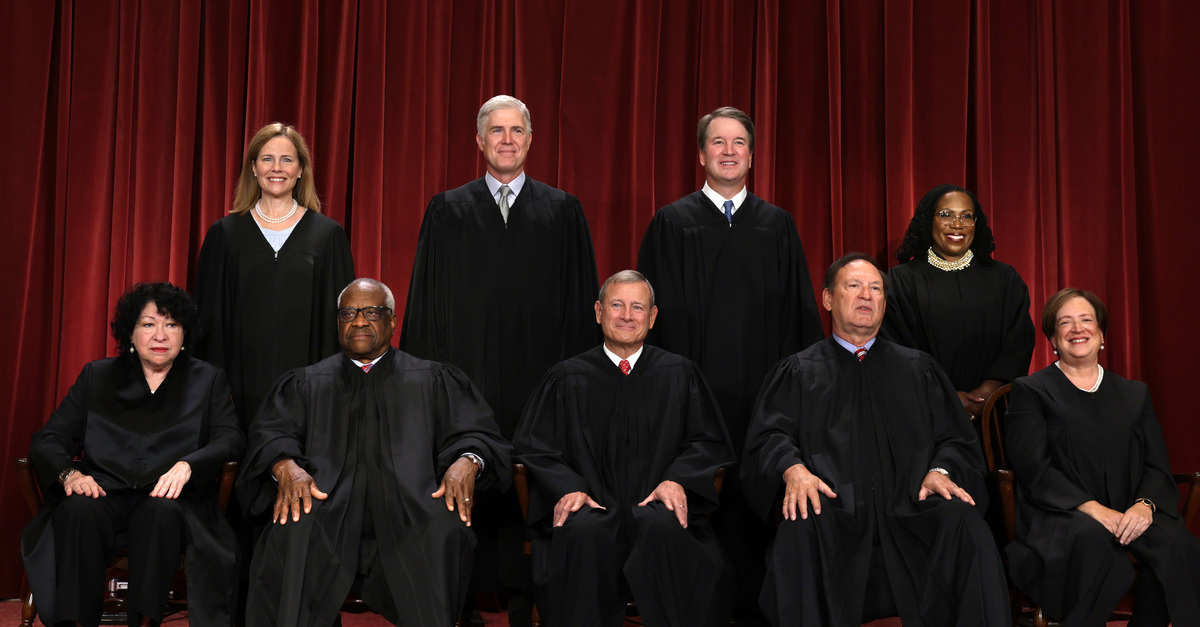
United States Supreme Court (front row L-R) Associate Justice Sonia Sotomayor, Associate Justice Clarence Thomas, Chief Justice of the United States John Roberts, Associate Justice Samuel Alito, and Associate Justice Elena Kagan, (back row L-R) Associate Justice Amy Coney Barrett, Associate Justice Neil Gorsuch, Associate Justice Brett Kavanaugh and Associate Justice Ketanji Brown Jackson pose for their official portrait at the East Conference Room of the Supreme Court building on October 7, 2022 in Washington, DC. (Alex Wong/Getty Images)
In the wake of mounting questions over Supreme Court Justice Clarence Thomas’ multiple undisclosed dealings with billionaire Harlan Crow — and noticeably fewer questions as to Justice Elena Kagan’s free bagels and Justice Samuel Alito’s Alaskan fishing trip — the justices’ off-bench earnings and benefits have recently come under increased scrutiny.
Despite myriad allegations, the Court and its members have remained tight-lipped, rarely commenting on specifics. Chief Justice John Roberts “respectfully declined” to appear before a congressional subcommittee on judicial ethics last April, leaving Senator Dick Durbin (D-Ill.) to blame the Court for contributing to a “crisis of public confidence” with its lack of candor.
This week, however, the Court dialed back its usual opacity and issued a relatively detailed and specific response to ethics questions about one justice’s extra-judicial earnings.
Justice Sonia Sotomayor, the Court’s most liberal justice and a frequent dissenter, was the subject of more than 100 open records requests by the Associated Press inquiring about her earnings from book sales and speaking engagements.
The AP released a report Tuesday that said documents revealed that Sotomayor’s university visits facilitated mass book sales that led to the justice earning nearly $4 million from her memoir “My Beloved World,” as well as her collection of children’s books.
According to the report, documents showed that Supreme Court staffers were directly involved with facilitating book sales to school and even “pressuring” institutions to purchase hundreds more copies than originally planned.
In a statement released Tuesday, the Supreme Court explained that its code of ethics encourages judges to “stay connected to community activities and to engage with the public, including by writing on both legal and nonlegal subjects.”
All judges, including the justices of the Supreme Court, “routinely travel and speak to university, college and law school audiences and affiliated individuals and entities,” and staffers “assist the Justices in complying with judicial ethics guidance for such visits, including guidance relating to judges’ publications.”
In stark contrast with the Durbin-Roberts correspondence that referred to Justice Thomas’ time aboard “superyachts” only obliquely, the Court’s statement Tuesday addressed Justice Sotomayor’s earnings head-on.
Read Related Also: Husband flees after shooting wife multiple times, pushing her out of vehicle onto highway, police say
“Justice Sotomayor’s Judicial Assistant has worked with the Justice’s publisher to ensure compliance with these standards, and at no time have attendees been required to buy a book in order to attend an event,” said the statement, which also noted that ethics rules permit judges to sign copies of their work.
“Schools have occasionally invited Justice Sotomayor to take part in a program in which they select a book for an entire school or a freshman class, and the Justice gives a book talk,” the statement continued. “When she is invited to participate in a book program, Chambers staff recommends the number of books based on the size of the audience so as not to disappoint attendees who may anticipate books being available at an event, and they will put colleges or universities in touch with the Justice’s publisher when asked to do so.”
It also addressed the topic of recusal and said that Sotomayor would have recused herself in cases involving her publisher, Penguin Random House, but that due to an “inadvertent omission,” Penguin participated in “several cases” that were ultimately denied review by the Court.
It also said that since these omissions, procedures for conflicts checks have been changed.
Turning to the topic of speaking engagements, the statement said that the Code of Conduct not only allows but encourages such events so that judges can “avoid isolation from the society in which they live and to contribute to the public’s understanding of the law.”
According to the statement, the Supreme Court typically ensures that the justices do not speak at events that are “fundraisers” and avoid events that are overtly political.
“Merely attending an event where an elected official might also be in attendance — such as several of the events described in your email — does not necessarily render the event impermissibly political in nature,” the Court’s response to the AP clarified.
The Court also clarified that justices may only earn up to $30,000 per year for teaching, and such teaching must be at an accredited educational institution, and approved in advance by the Chief Justice.
Have a tip we should know? [email protected]








